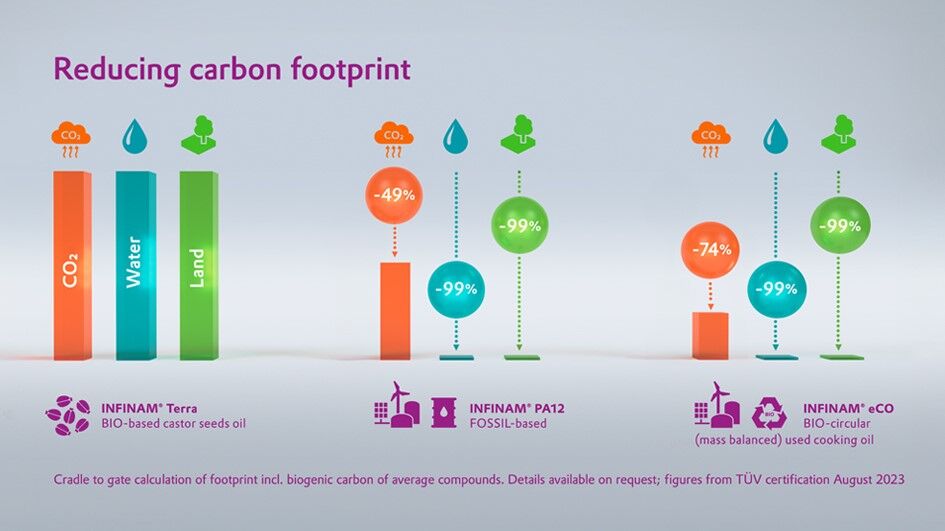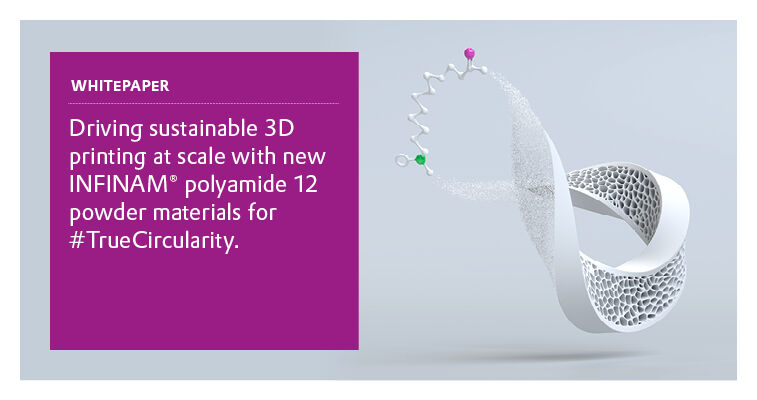
- 100 percent substitution of fossil feedstock with bio-circular raw material from waste cooking oil
- 74 percent less CO2 emissions compared to own castor oil-based polyamides
- Formula to drive circular plastics economy in 3D printing
Evonik is driving circular plastics economy in additive manufacturing. The leading specialty chemicals company is introducing a new grade of its polyamide 12 powders that is designed to unbound sustainable 3D printing at scale. INFINAM® eCO PA12 is the world’s first PA12 powder material for industrial 3D printing that substitutes 100 percent of fossil feedstock with bio-circular raw material from waste cooking oil in a mass balancing process.
The new, ready-to-use powder features a reduction of CO2 emissions of 74 percent in comparison to the castor oil-based polyamides of Evonik’s own INFINAM® Terra development grade. Having already launched a new PA12 grade with reduced carbon footprint in late 2022, Evonik is now fully aligning its portfolio of polyamide 12 powders with its circularity approach. Evonik will present its formula to drive circular plastics economy in 3D printing during the Formnext trade show, Frankfurt am Main Germany, November 7-10, 2023 in hall 12.1 at booth C39.

Bio-circular raw materials as starting point for true circularity
True circularity starts with bio-circular raw materials. More than 15 million tonnes of waste cooking oils are produced annually in the world by restaurants, grocers, hotels and casinos, and other foodservice providers. In addition to other end-of-life possibilities like being processed into biodiesel, waste cooking oil can be used as raw material source for chemical production.

“True circularity is key for being successful in the future. As a pioneer for polymer-based 3D printing materials, Evonik has developed a formula for its PA12 powders to drive circular plastics economy in additive manufacturing”, says Dominic Störkle, Head of the Additive Manufacturing Innovation Growth Field at Evonik. “With the introduction of INFINAM® eCO PA12, we go far beyond chemistry to start closing the loop, and meet the market’s expectations for a better future.”
INFINAM® eCO PA12 contributes to both footprint and handprint circular values. Besides an improved carbon footprint rate due to renewable energy use for production and bio-circular raw material, Evonik’s new polyamide 12 grade provides proven reusability rate of 100 percent of the structure support powder, with a refresh rate of 70/30 of used versus virgin material over several printing cycles, all the while exhibiting excellent processability and stable mechanical properties of 3D printed parts.
Holistic circularity approach
Evonik’s formula to drive circular plastics economy is based on four main cornerstones:
- reuse
- reduce
- renewable
- recycle
In addition to factors like production efficiency or reusability of materials, Evonik’s circularity approach includes the total life cycle assessments of its PA12 formulations and their consistent improvement. The specialty chemicals company looks at carbon footprint along with other important factors such as water consumption and land use. By using renewable energy and renewable or recycled feedstocks for production, the group significantly improves the overall eco-balance of its materials. In looking ahead, Evonik is exploring new end-of-life opportunities for PA12 powders to fully close the loop.
The “eCO” description stands for the company’s goal of avoiding the greenhouse gas carbon dioxide by using renewable or circular raw materials via the mass balance approach. This method enables an immediate reduction of CO2 in existing plants quality of the products.
Evonik’s 3D printing activities are bundled in the group’s Additive Manufacturing Innovation Growth Field. The strategic focus here is on developing and manufacturing industrial, ready-to-use high-performance materials for all major polymer-based 3D-printing technologies. In this way, Evonik can drive 3D printing as a large-scale industrial manufacturing technology along the entire value chain. The Additive Manufacturing Innovation Growth Field’s product range is marketed under the new INFINAM® brand.
In this whitepaper, Evonik showcases footprint impact of its new PA12 powders for powder bed fusion 3D printing based on cradle-to-gate results of TÜV Rheinland certified life cycle assessments. Furthermore, Evonik’s own reusability case study of the group’s PA12 powders has been elaborated on the following pages as well.
About Evonik
Evonik is one of the world leaders in specialty chemicals. The company is active in more than 100 countries around the world and generated sales of €18.5 billion and an operating profit (adjusted EBITDA) of €2.49 billion in 2022. Evonik goes far beyond chemistry to create innovative, profitable, and sustainable solutions for customers. About 34,000 employees work together for a common purpose: We want to improve life today and tomorrow.
About Smart Materials
The Smart Materials division includes businesses with innovative materials that enable resource-saving solutions and replace conventional materials. They are the smart answer to the major challenges of our time: environment, energy efficiency, urbanization, mobility and health. The Smart Materials division generated sales of €4.83 billion in 2022 with about 7,900 employees.
Source
Evonik, press release, 2023-10-24.
Supplier
Evonik Industries AG
Smart Materials 3D
Share
Renewable Carbon News – Daily Newsletter
Subscribe to our daily email newsletter – the world's leading newsletter on renewable materials and chemicals










